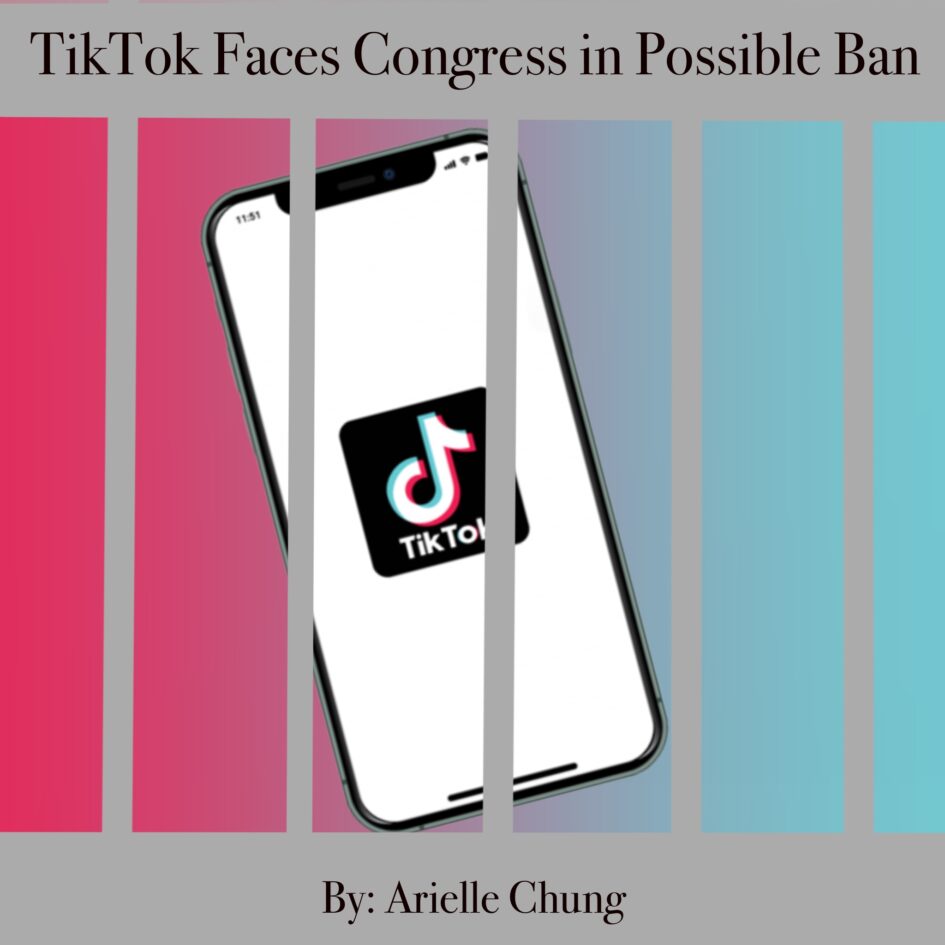
April 28th, 2023
One of the most popular apps in the world, TikTok has over 1 billion global users, a number which probably includes you as well. However, in the past and coming weeks, the company is becoming at risk of losing its biggest market in the United States, where more than half the country and ⅔ of teens have the app.
The resurgence of a possible ban comes as TikTok is thrown under the microscope of the U.S. government again. On March 23, 2023, Tiktok’s CEO Shou Zi Chew testified against the United States Congress in a hearing regarding the country’s concerns towards the app being used. The action that America decides to take towards the app will likely influence other governments to reevaluate and make some changes to their policies. Chew himself is not of Chinese nationality – he is a Singaporean businessman and attended university at Harvard. The Congress’s main argument for calling Chew in is in the interest of national security, as TikTok is connected to the Chinese government and Communist Party. It is owned by ByteDance, a Chinese internet company. Under Chinese law, any Chinese company is required to give up or share data with the Chinese Communist Party (CCP) for so-called “national security reasons”. Because of this liability, the U.S. government is afraid that the Chinese government is using its assets within TikTok to spy and influence American citizens for personal interests. TikTok’s main rebuttal against a ban or possible restrictions is that they are an instrument of free speech, which is protected under the First Amendment and cannot be prohibited.
However, I felt the hearing was a bit unconstructive, as both parties seemed to speak of skewed views and shady responses, with an undertone of making themselves look good rather than dissecting the problem itself. There are some unfair accusations made on the side of the U.S. congress. In their reasoning, they talked about a variety of issues with the app – addictive algorithms, propaganda, data and information collection, and more. Yes, these are issues that should be regulated, however, there are the same problems in so many other social media companies, such as Instagram and Facebook. It may be fair to say TikTok uses and hosts these unethical practices no more than any other platform. Why should it be any more unacceptable than in other cases? They seem to be taking this opportunity to use TikTok as a scapegoat for all the tech industry’s sins.
A lot of the U.S.’s questions seemed to be political grandstanding, or trying to make themselves look good. Some watchers interpreted this as the government trying to look harsh and intimidating against Chinese affairs without really having to take action. A few questions were silly, such as a question of whether TikTok operated off home wifi, showing some gaps in the inquisitor’s understanding. It makes for a rather selfish image of the Congress, interested in fulfilling their own biases rather than being collaborative and fair. On the side of TikTok, their act was unconvincing and felt suspicious. Whilst Chew held up his own and answered most questions as readily as possible, there were gaps. Answers were most often indirect, strategically evading a straightforward answer or looping around the actual point. Instances occurred where he was repeatedly asked to answer in a simple yes or no format, but instead Chew drew out his answers in foggy sentences. His non-committal appearance and attitude leaves room for appropriate suspicion as to what could be happening so that he can’t give convincing, adequate responses.
According to surveys by Pew Research Center, more Americans agree with the ban than disagree in a ratio of 2:1. The move against TikTok and the hearing united most politicians, an unusual occurrence. However, there are some odd ones out. For example, AOC released her first ever TikTok video as a result of this event, speaking against the banning of the app. She does, however, gain a large amount of support and following amongst the platform. In fact, the opinions of citizens are closely linked to their personal relationship or usage of the app; only 19% of TikTok users support the notion, and 11% of non-users oppose it. Once people have the opportunity to be familiar and reap the benefits of this app, it is bound to give off a more favorable opinion.
So, should TikTok be banned? I don’t have the app, but it’s more because I don’t like the way it alters my character and how it makes me feel than for security reasons. Still, while I do think the app hosts a lot of new opportunities and is a place of important exposure for many small businesses, I think it should be banned. I feel as though it’s almost a guarantee China is using and collecting data of everyone through TikTok – who wouldn’t if you had the opportunity to? It seems stupid to not use this advantage. Somehow, the government is still waiting for a formal confirmation from the CCP that they’ve been collecting data on users in order to take action against them. I don’t think anyone would admit to such a serious charge just like that, especially not a country like China whom the west have tensions with. The gravity of this situation is real. This is a country which has the people, resources, motives, and now data, to do real damage and control the very workings of our own nation. Businesses and influencers can rebuild on other platforms, but trying to regain authority over a manipulated government system and country is incredibly difficult. It is a matter of national security and privacy which must be protected in order to operate and build a future we want, and this conversation is long overdue.
Categories: Editorials
